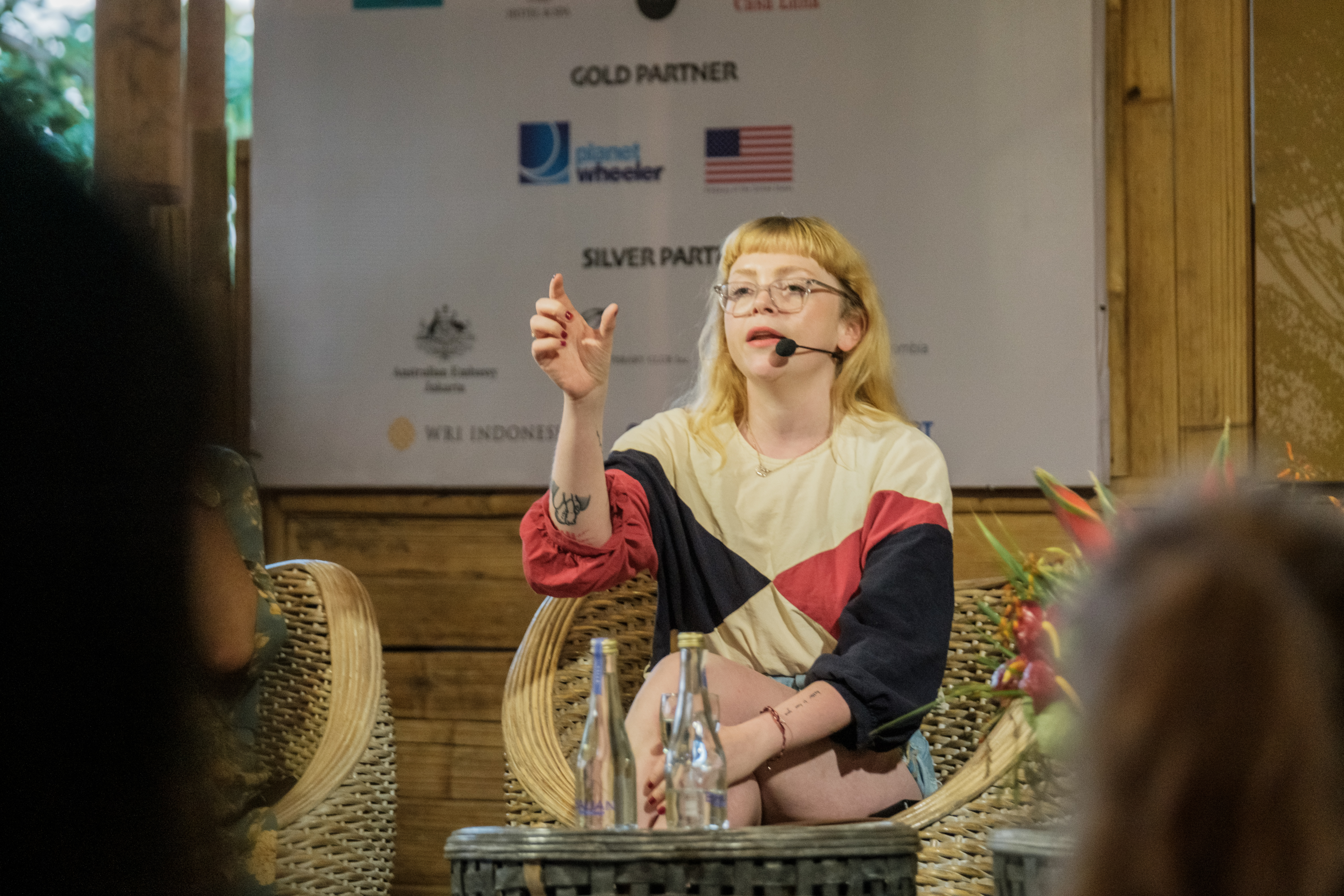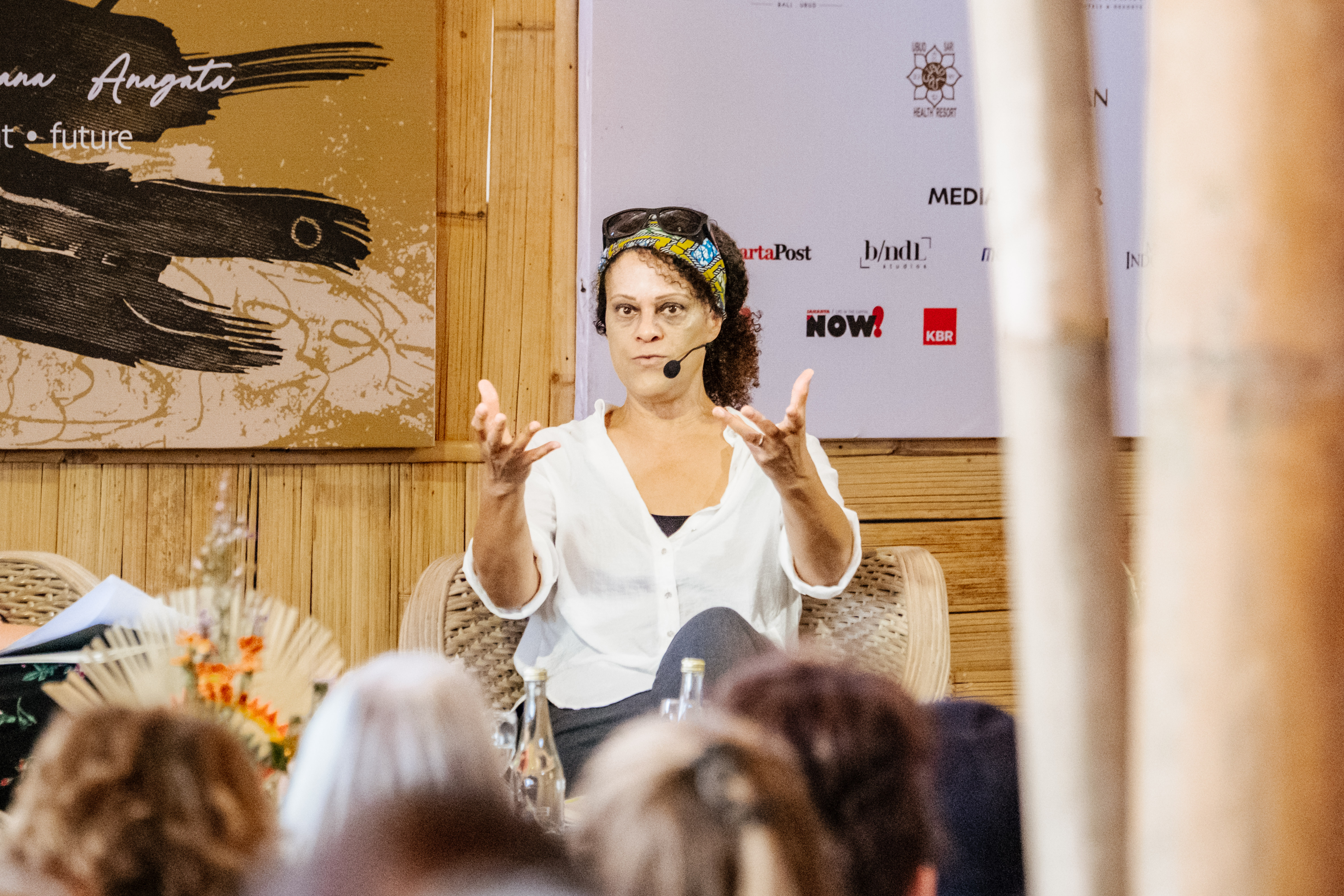
5 minute read
Lessons for aspiring writers from Ubud Writers and Readers Festival 2023.
Ubud Writers and Readers Festival: Fostering an Artistic Community
BY SAOIRSE RAFFERTY
Ubud Writers & Readers Festival celebrated its 20th anniversary with an impressive lineup of diverse artists and activists, from Booker Prize winner Bernardine Evaristo to Indonesian songwriter Kartika Jahja. Throughout these past 20 years, there has been plenty of political con ict, natural disasters & war happening around the world, but each year this special community of artists gathers with a shared love of creating art and change.

What makes UWRF stand out is its unique sense of inclusion. The lines between the stage and audience blurred; the microphone was passed around and guest speakers were o en found in the crowd, mingling and enjoying the talks of other writers. At the open mics, acclaimed published poets read alongside aspiring local artists. The title of ‘writer’ wasn’t viewed as a superior achievement only the elite could earn; everyone involved in the festival was a part of this community of artists, making the possibility of publication feel tangible. Very inspiring indeed!
Scottish poets Hollie McNish and Michael Pedersen were mingling amidst the crowd. The duo travels to many di erent festivals and events worldwide, earning an income from gigs and tours. They feel it’s unhealthy to put all of your nancial and personal pressure on one book making it big, so they invest their time in multiple projects. “It’s not just how many people buy your book or attend the event. Everywhere you go is an opportunity to gain followers and connect with more people,” says Hollie, who has a large social media following.

Many writers spend their lifetime hunched over a laptop screen creating stories, hopelessly drowning in rejection emails and quietly suffering through the obligatory writer’s block. What we learned at the festival is that it is so worth it to get out and connect. Irish author Megan Nolan and Indonesian author Dias Novita Wuri started their writing careers while networking and reading at literary events. Both believed it was ‘luck’ that they happened to bump into a person who accelerated their writing careers. Networking and attending community events seems just as important, if not more than spamming publishers’ inboxes. Megan spent all of her free time at events volunteering to read. Dias started out writing short stories for newspapers before she wrote her rst novel. She is close friends with other writers whom she exchanges work with: “You can both hold each other accountable and celebrate those wins together.”
“Networking and attending community events seems just as important, if not more than spamming publishers’ inboxes”.
So how do you go about finding ‘your people’ or becoming a part of a creative community?

Booker Prize winner Bernardine Evaristo encourages everyone to create the community they crave if it’s not possible to fin one. She has lived her life in an unconventional way and gladly embraces being an ‘outsider’. Instead of resisting her identity or becoming a victim, she immersed herself in activism. She cofounded the Theatre of Black Women, and even though they were struggling financially , she devoted her time and creative energy to it because it was something she was passionate about. She wore distinctive, colorful clothes and lived cheaply, prioritizing travel and community. All of these choices helped feed her creativity. So instead of needing success and publication to happen immediately, consider allowing the inevitable dips and changes in your life, and weaving them into your creative process. Focus on your reason why instead of stressing about a timeline.
“I didn’t belong and I didn’t care because I didn’t want to belong”. Bernardine Evaristo
Even though we can never fully grasp what it’s like to be in another’s shoes, this year’s Ubud Writers & Readers Festival opened doors and helped us travel between the past, present, and future, amongst various cultures and time periods.
We were able to take a closer look at the sffering many have undergone and discuss the current con icts happening around the world. During the talk on the ongoing IsraeliPalestinian con ict, the room was so crowded that audience members were sitting on the oor and leaning against walls, but everyone held space in complete silence for what speakers Michael Vatikiotis and Anthony Lowenstein had to share. The solidarity and compassion in the room was palpable in the quietly serious air.

During the four-day festival, individual attendees became a collective ‘we’, remembering the importance of community in the writers’ journey but also throughout life. We need people to brainstorm ideas with, to celebrate the wins and to share the struggles. People to compete against and to hold us accountable. People we can trust and who feel safe. Author Jill Dawson started writing in a male-dominated industry, and was uneasy sharing her work. “It is daring to speak out publicly when you’re unsure if you’ll be listened to. At Ubud Writers & Readers Festival, I always feel it’s a safe community where I’ll be heard.” Overall, the festival was a great reminder to stay persistent and build resilience as writers. But also to make sure that we leave our desks, leave our houses, and get involved in communities with people who share our passions. And a er the festival we were glad to come home to our Women Who Write community, swap notes from our favorite festival of the year, and to continue our artistic journeys together.

For more information about Ubud Writers and Readers festival visit https://www.ubudwritersfestival.com/.
Sign up for updates https://www.ubudwritersfestival.com/subscribe.








